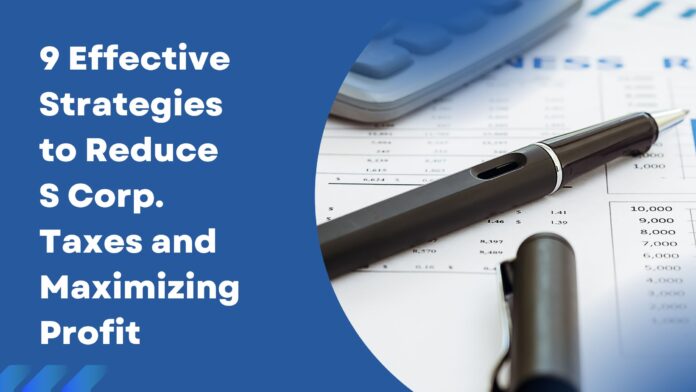Introduction
As a business owner, understanding your tax obligations and optimizing your financial strategies is vital. If you own an S corporation, there are several tactics you can employ to reduce your taxable income, thereby maximizing your profits effectively. In this blog post, we’ll explore nine effective strategies to help you save on your S Corp taxes.
Reduce S Corporation Owner’s Wages
One common strategy to reduce taxes is to lower the owner’s salary. According to IRS guidelines, an S Corp owner should pay themselves a “reasonable” salary for the work they do. While the term “reasonable” is somewhat subjective, it generally refers to the market rate for similar roles in similar businesses. Reducing your wages means less income subject to payroll taxes, and any remaining profit can be distributed as dividends, which are not subject to self-employment tax.
S Corporation Covers the Owner’s Health Insurance Premiums
As an owner-employee of an S Corp, you can deduct the cost of your health insurance premiums. The corporation can pay the premiums directly or reimburse you for payments made. The premiums are then included in your W-2 wages and are deductible on your individual tax return, providing a significant tax benefit.
Employ Your Child
As an S corporation owner, it is important to understand the financial implications of paying payroll taxes on your child’s wages while also considering the potential benefits in terms of income tax reduction for your family. It is worth noting that the Internal Revenue Service (IRS) allows each child to earn up to $12,000 without incurring any federal income taxes. This provision offers a valuable opportunity for optimizing your tax strategy and managing your family’s financial well-being.
In the realm of employing children within an S corporation, it is essential to recognize the interplay between payroll taxes and income taxes. While the S corporation owner is responsible for paying payroll taxes on their child’s wages, it is crucial to evaluate the broader implications. By providing your children with employment and compensating them fairly for their contributions, you can potentially shift taxable income from your higher tax bracket to their lower tax bracket. This strategic approach can result in a decrease in the overall tax burden for your family.
Reimbursement of Home-Office Expenses
If you use part of your home for business, you may be eligible for a home office deduction. You can deduct a portion of your mortgage interest or rent, utilities, insurance, and depreciation. The S Corp can reimburse you for these expenses, effectively converting non-deductible personal expenses into deductible business expenses.
Rent Your Home to Your S Corporation
Renting your home to your S Corp for business purposes, such as meetings or employee parties, can also provide tax advantages. The rental income you receive is not subject to self-employment tax, and the S Corp can deduct the rental expense.
Reimbursement of Depreciation Expenses
If your S Corp uses your personal assets, such as a vehicle or equipment, you can charge the corporation for their use. This is often done through depreciation, where you deduct the cost of the asset over its useful life. The S Corp can then reimburse you for this expense.
Reimbursement of Vehicle Expenses
If you use your vehicle for business purposes, you can deduct a portion of your vehicle expenses, including gas, maintenance, insurance, and depreciation. You can use either the standard mileage rate or actual expenses method to calculate your deduction. The S Corp can then reimburse you for these expenses.
Reimbursement of Travel Expenses
Business travel expenses, such as airfare, hotel stays, and meals, are deductible business expenses. If you incur these expenses personally, your S Corp can reimburse you. This effectively turns personal out-of-pocket expenses into deductible business expenses.
Cell Phone Expenses
If you use your cell phone for business, your S Corporation can reimburse you for a portion of your phone bill. You need to determine the percentage of business use versus personal use, and that portion can be claimed as a business expense.
Keep in mind, however, that if your S Corp pays your entire cell phone bill, this could potentially be seen as a taxable fringe benefit. It’s crucial to keep detailed records demonstrating that your phone is primarily used for business purposes.
Conclusion
Owning an S Corporation comes with numerous potential tax advantages, but it’s crucial to make the most of them. By employing strategies such as reducing your salary, employing your child, and taking advantage of various reimbursements, you can significantly reduce your S Corp’s taxable income and maximize your profits.
However, tax law is complex and ever-changing. It’s always a good idea to consult with a tax professional or accountant to ensure you’re making the most of your tax strategies and staying within legal boundaries. These professionals can provide personalized advice based on your unique business situation and goals.
Remember, the key to tax planning is to stay proactive and informed. With the right strategies and advice, you can ensure your S Corp is as profitable as possible.
Disclaimer: The information in this blog post is intended for general informational purposes only and does not constitute legal or tax advice. Consult with a professional tax advisor or CPA for advice on your specific tax situation.










